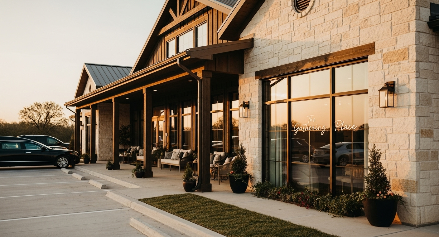From Somber to Celebratory: Why a Funeral Home That Doubles as an Event Space in Texas is the Future of Community

Funeral Home That Doubles as an Event Space in Texas I’ll never forget the palpable tension in the room. I was consulting for a family-owned funeral home on the outskirts of Austin, a place run by a third-generation funeral director who had just sunk a small fortune into building a state-of-the-art “reception center” adjacent to his chapel. He was terrified he’d made a catastrophic mistake.
On one particular Saturday, his new model was put to the ultimate test. At 11 AM, the main chapel hosted a quiet, poignant memorial service. By 6 PM, the new reception hall was booked for a raucous 50th wedding anniversary party.
I watched, fascinated, as his team performed what they called “the flip.” The hushed reverence of the morning, with its solemn flower arrangements and soft organ music, was methodically transformed. In its place emerged a vibrant tableau of colorful centerpieces, a polished dance floor, and a five-piece band tuning their instruments. The air, heavy with grief just hours before, was now electric with anticipation.
The turning point for the nervous owner didn’t come when he cashed the check. It came late in the evening when the silver-haired couple celebrating their anniversary pulled him aside. With tears in her eyes, the wife told him, “We chose this place because it feels significant. We wanted our joy honored in a venue that understands the gravity of family milestones—the happy and the sad.”
In that moment, the owner understood. He wasn’t just renting out a room; he was providing a space for life’s most profound moments. This encounter reveals the true story behind the rise of the funeral home that doubles as an event space in Texas. It’s not just a clever business pivot; it’s a return to the institution’s original, forgotten role as a cornerstone of the community.
More Than a Trend: It’s a Return to Community Roots
For most of the 20th century, the funeral home was a purpose-built place of quiet sorrow. But if we look back further, the local “undertaker” was often a central figure in town life, and their establishment was a de facto community center. It was a place where people gathered, supported one another, and marked the passages of life.
The modern pivot toward hosting weddings, quinceañeras, corporate events, and anniversary parties isn’t a radical departure. It’s a powerful reclamation of that heritage. Driven by profound shifts in both culture and economics, funeral homes are rediscovering that their greatest asset isn’t just their ability to handle death, but their capacity to house the full spectrum of human experience. They are moving away from being single-purpose facilities and evolving into multi-faceted community hubs.
The Unspoken Drivers: Cremation, Culture, and Cold, Hard Cash
This evolution isn’t happening in a vacuum. Three powerful forces are converging to make this business model not just viable, but brilliant. For any funeral director watching their revenue streams change, or for any family searching for a meaningful and affordable venue, these are the factors that matter most.
The Cremation Equation: Unlocking Valuable Real Estate
The single biggest driver is the undeniable shift away from traditional burials. The National Funeral Directors Association (NFDA) projects that by the close of 2025, the U.S. cremation rate will climb to approximately 62.1%, while the burial rate is expected to fall to just 32.9%.
For decades, Texas held fast to burial traditions. But the tide is turning, and the state’s cremation rate is rapidly catching up. This creates a fascinating business problem: what do you do with a large, beautiful, and expensive chapel designed for casket viewings when fewer families require it? These once-essential spaces risk becoming underutilized assets, a drain on resources. The answer is to reimagine their purpose. That grand, high-ceilinged room with perfect acoustics is suddenly an ideal setting for a wedding ceremony, a corporate town hall, or a milestone birthday bash.
A Cultural Shift: From Mourning to “Celebration of Life”
Consumer attitudes are changing just as quickly. A recent NFDA consumer survey revealed a telling statistic: over 55% of respondents feel that the importance of religion in a funeral service has declined. In its place is a growing desire for highly personalized “celebration of life” events.
Today’s families often want more than a somber service; they want a memorial that reflects the unique personality and passions of their loved one. This might look more like a party with a favorite playlist, a catered meal, and an open mic for sharing stories. This cultural pivot cracks open the door for venues that can accommodate a more celebratory, less formulaic gathering. A funeral home that doubles as an event space in Texas is perfectly positioned to meet this demand, offering a dignified backdrop that can be customized for any tone, from reverent to jubilant.
The Smart Business Play: Retrofit, Don’t Rebuild
Let’s talk brass tacks. Building a new, dedicated event venue from the ground up is an incredibly expensive proposition, costing upwards of $200-300 per square foot in today’s market.
Funeral homes, on the other hand, are sitting on a goldmine of existing infrastructure:
- Ample, dedicated parking lots—a premium feature many venues lack.
- Large, flexible gathering halls designed for crowds.
- Commercial-grade restrooms built to handle high traffic.
- Existing catering kitchens or prep areas.
- Built-in audio-visual systems.
The cost to retrofit these facilities—perhaps by adding a dance floor, updating the lighting, or creating a separate entrance for event guests—is a mere fraction of the cost to build new. It allows funeral directors to create a robust new revenue stream, ensuring the financial health of their business for generations to come while better serving the changing needs of their community.
“Why Not Celebrate the Good Times, Too?” A Look Inside a Houston Pioneer
Nowhere is this philosophy more elegantly executed than at Bradshaw-Carter Memorial & Funeral Services in Houston. Far from hiding their dual purpose, they embrace it. Their famed “Party Barn” is a testament to this forward-thinking approach.
Co-owner Tripp Carter famously explained the vision to the Houston Chronicle, putting it in simple, human terms: “Our thought was, we have this beautiful facility, and it’s a shame it’s only used for sad occasions. We’re in the business of helping families through a difficult time. Why not help them celebrate the good times, too?”
This isn’t about disrespecting the primary mission of the funeral home. It’s about expanding it. By hosting joyous events, places like Bradshaw-Carter build relationships with families outside the context of grief. When a family has celebrated a wedding or an anniversary on their grounds, the space becomes associated with love and happiness. Should that same family later face a loss, returning to a familiar, positive environment can provide a profound sense of comfort and continuity.
What to Expect When Booking an “Unconventional” Venue
If you’re planning a major event in Texas, you might be surprised to find that a local funeral home’s event center is a leading contender. So, what should you know before you explore this option?
The Benefits for You, the Event Host:
- Unexpected Elegance: Many of these facilities are architecturally beautiful, with high-quality finishes, manicured grounds, and a sense of permanence that you won’t find in a sterile hotel ballroom.
- Practical Advantages: The built-in benefits are huge. You won’t have to worry about parking logistics, and the venues are almost always ADA-compliant and easy to navigate.
- Cost-Effectiveness: While not always the “cheapest” option, they often provide incredible value. Because they are leveraging existing assets, pricing can be highly competitive compared to dedicated event-only venues.
- A Respectful Atmosphere: The staff at these venues are masters of compassionate, discreet service. They understand the importance of your event and bring a level of professionalism and decorum that is second to none.
Key Questions to Ask:
- How do you manage scheduling? Ask about their policies for ensuring total separation between memorial services and private events. Most have separate entrances, dedicated staff, and rigorous scheduling to prevent any overlap or awkward encounters.
- What are your policies on alcohol and music? Every venue is different. Be clear about your expectations for the style and volume of your celebration.
- Is there a dedicated event manager? While the staff is skilled, confirm you will have a single point of contact focused solely on the success of your event.
- Can we see photos from different types of events? Ask to see a portfolio that showcases the space’s versatility, from a wedding reception to a corporate luncheon.
The Future is a Shared Space
The emergence of the funeral home that doubles as an event space in Texas is more than a novelty; it’s the logical, compassionate, and historically resonant future of the industry. It’s a recognition that life and death are not opposites, but two parts of a whole. A building that can respectfully hold our grief on a Tuesday can just as beautifully hold our joy on a Saturday.
These pioneering Texas businesses are not erasing their identity; they are expanding it. They are creating spaces where the full, messy, beautiful scope of community life can unfold, proving that our most important milestones—from birth to death and every celebration in between—can, and perhaps should, find a home under one roof.
What are your thoughts on this evolution? Would you consider hosting a celebration at a venue like this? Share your perspective in the comments below or pass this article along to someone planning a major life event in Texas.
Frequently Asked Questions (FAQs)
Isn’t it morbid or strange to have a wedding at a funeral home?
This is the most common first reaction, but the reality is quite different. These modern event centers are often physically separate from the chapels or viewing rooms, with their own entrances and ambiance. The focus is on beautiful architecture and versatile design, not on the business’s other functions. Think of it less as “having a party at a funeral home” and more as “renting a beautiful, well-equipped event hall that happens to be owned by a funeral director.” The atmosphere is one of significance, not sadness.
Are these venues cheaper than traditional event spaces in Texas?
Often, they offer better value. While pricing varies, funeral home event centers can frequently be more affordable because they are leveraging an existing property rather than trying to recoup the cost of a brand-new build. When you factor in included amenities like ample free parking, tables, chairs, and AV equipment—costs that add up quickly at other venues—the savings can be substantial.
How do they handle scheduling conflicts between a funeral and a party?
Professionalism and meticulous planning are key. These businesses are run by people who are experts in logistics and discretion. They use sophisticated scheduling systems to ensure there is no temporal or spatial overlap. Events are often held in separate wings or even entirely separate buildings on the same property, ensuring complete privacy and respect for all guests and families, regardless of the reason for their visit.
What kind of amenities can I expect at a funeral home event center?
You can expect most of the amenities of a modern event hall, and sometimes more. This typically includes flexible seating arrangements, professional-grade audio-visual systems for presentations or slideshows, catering prep kitchens, and beautifully maintained grounds perfect for photos. Because they are designed for public speaking, the acoustics are often far superior to those in repurposed industrial spaces or hotel conference rooms.
Is this trend only happening in Texas?
While this trend is visible across the United States, Texas provides a particularly fertile ground for it to flourish. The state’s strong emphasis on family, community, and tradition, combined with a culture that loves a grand celebration (like quinceañeras and large weddings), makes it a perfect case study. The business-friendly environment and the specific economic pressures from a rising cremation rate have accelerated the adoption of this model in the Lone Star State.





I love the efforts you have put in this, thanks for all the great blog posts.
i2bg5c